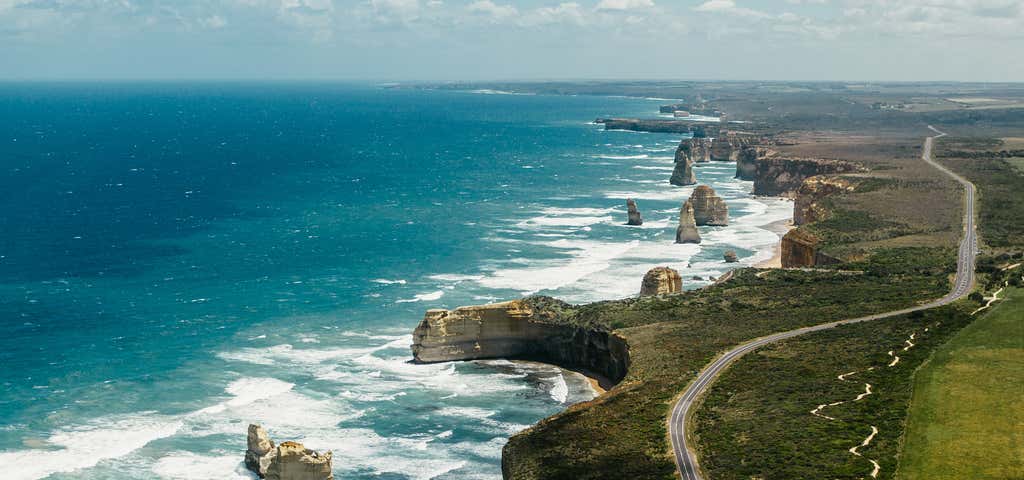The Great Ocean Road is almost universally heralded as the finest scenic drive in Australia. Hugging a wild, cliff-lined, beach-nibbled coastline east of Melbourne, it's home to waves, whales and some of the world's most striking coastal scenery. But to let you in on a little secret... the road stays great all the way to Adelaide, another 600 kilometres to the west. Plan to dawdle; there's so much to see and do on this drive.
To get the best of the views, start in Melbourne and head west so that you're on the side of the road that's pressed hardest against the coastline.


"The 12 Apostles (which are actually only eight)" — Photo Credit: Shutter stock
Even if you have only the slightest bit of surf style in you, prepare to swoon when you reach Bells Beach. This is Australia's most famous surf break (it was here that Patrick Swayze swam out into the killer wave in the final scene of Point Break) and scene of the Easter Rip Curl Pro competition. There are great vantage points along the cliffs to watch the wave riders, or take the steps down onto the beach and join them. This isn't, however, any sort of place to learn to surf, though you can do that just down the road at Anglesea.


"Great Otway National Park" — Photo Credit: Visit Victoria
3
Forrest Brewing Company
Detour off the coast and into the folds of the rainforest-smothered Otway Range to find the small, reinvented town of Forrest. Life in the former logging town now revolves around bicycles and beer, with more than 60 kilometres of world-class, purpose-built mountain-bike trails coiling through the bush outside of town. When the day's riding is done, join all the other cyclists at the Forrest Brewing Company, where, beneath the bikes hanging from the ceiling, you can work through the list of more than half-a-dozen craft beers and the ever-changing seasonal menu in the relaxed restaurant.
4
Brae
Twenty minutes' drive further inland from Forrest is the unexpected Brae, a rural property that was named in the world's 50 best restaurants in 2017. One of only two Australian restaurants to make the esteemed list, Brae sources its produce from its own 12-hectare organic food garden, bringing to the table the likes of free-range eggs, hive-harvested honey and olive oil from its dozens of olive trees. Each day's menu is driven by the garden's bounty. Book well ahead - you don't get to be this good and not have a plethora of food groupies visiting daily..
Back on the coast, at the southernmost point of this journey, an evocative lighthouse is staked at the edge of Cape Otway. Built in the 1840s, it beams out across unruly Bass Strait, and offers the rare chance to sleep a night in former lighthouse keeper cottages. But the real attraction here is some of the cape's wild residents - this is one of the surest places in Australia to see that most cuddly of Australian animals, the koala. Often accused of being stoned, their sleepy appearance is actually due to the furry little guys reserving their energy. Eucalyptus leaves aren't, by all accounts, very full of nutrients. So simply peer into the tall eucalypts that line the road and you might spy one sleeping in the fork of a tree. Conserving energy.
6
Triplet Falls
Another often-overlooked highlight of the Great Ocean Road is the plethora of stunning waterfalls skidding through the rainforest of the Otway Range. Just four kilometres down the road from Otway Fly Treetop Adventures is the start of the walking track to one of the most beautiful of them, Triplet Falls, pouring over cliffs into an enclosure of ferns. The one-kilometre walk to the falls passes beneath stands of mountain ash, the tallest flowering plant in the world. (Please note, there are quite a few stairs so it could be a little hard if you’re with small children or have a dodgy knee…)
If the coast is the star feature of the Great Ocean Road, the thick pelt of rainforest across the Otway Range isn't far behind. At Otway Fly Treetop Adventures, you can immerse yourself in that forest, striding out on a suspended metal walkway through the canopy of the rainforest, 25 metres off the ground. Get an extra buzz by climbing the 45-metre-high tower that sways in the wind, or join a zipline tour, whirring and squealing through the trees, suspended from a wire, 30 metres above the forest floor.
8
Wreck Beach
The western end of the Great Ocean Road threads through an area known as the Shipwreck Coast...with good reason. More than 600 vessels have come a cropper along this coastline, and if you take the 350 steps down onto Wreck Beach you'll find the rusting anchors of the Marie Gabrielle and the Fiji embedded among rock pools. If you want to stretch the legs a little more, this is a good spot for it, with Wreck Beach part of the 100-kilometre-long Great Ocean Walk. Turn east and walk to Gable Lookout and you'll soon be standing atop some of the highest sea cliffs in mainland Australia. And you can see forever!
The Great Ocean Road's headline act is this ellipsis of ever-crumbling limestone sea stacks just outside the town of Peterborough. Count the stacks and you'll quickly discover the error in the name - there are only eight of them (calling them the Eight Crumbling Stacks would probably have ruined the moment for everyone) - but don't let the facts get in the way of such sublime scenery. A boardwalk connects a series of viewing platforms atop the cliffs, providing views of the wild Southern Ocean as it wraps itself around the stacks.
Rare is the opportunity to stand on the coast and watch a bay full of whales, but that chance comes every year at Logans Beach in Warrnambool. Here, between June and September, southern right whales return from sub-Antarctic waters to calve in the coastal waters. Sighting them is simplicity itself with a long wooden viewing platform built into the dunes behind the beach. Mothers and calves can often be seen within 100 metres of shore.
11
Tower Hill Wildlife Reserve
Little-known fact... the most recent volcanic eruptions in Australia were in south-west Victoria and across the South Australian border into Mount Gambier. As recently as 5000 years ago. These plains are now dotted with volcanic remnants, including Tower Hill right beside the highway. This ancient crater is filled with two lakes and a host of native wildlife - expect emus, koalas, turtles, echidnas and kangaroos. It also provides the chance for a glimpse into Aboriginal life and culture, with Indigenous guides leading tours from the Tower Hill Natural History Centre that include bush-tucker searches and boomerang throwing.
12
Basalt Wines
Call in at the only winery directly on the Great Ocean Road for a cellar door with a difference. Just before you reach Port Fairy, on a former potato farm, Basalt Wines is a biodynamic winery with a rustic cellar door inside a tin shed. If it sounds basic, wait until you see the menu at the winery cafe - think tapas serves of Spanish mussels with Galician sauce, or duck rillette with foie gras. All that with a cigar menu as well... Montecristo No 4, anyone?
13
The Port Fairy & Region Visitor Centre
Why would you not want to stop at a place that was once named the world's most liveable small community? Seaside Port Fairy is as whimsically likable as its name suggests. The Port Fairy Folk Festival, held every March, is one of Australia's top music shindigs, or you can come anytime to work through the menu at Fen, one of Victoria's finest restaurants, and cosy up inside one of the town's many holiday rental homes.
Just west of Portland, off the main highway at Cape Bridgewater, is Australia's largest mainland breeding colony of seals. Sure, you can look down on them from a cliff-top viewing platform, but a Zodiac trip with Seals by Sea Tours will whisk you across the water to the edge of the colony itself. To get a little more intimate, there's the option of donning a snorkel and mask and climbing into a submerged cage, where you might just get eye to eye with the inquisitive Australian and New Zealand fur seals. Grab some R&R time afterwards chilling out on the postcard-perfect white sands of Cape Bridgewater's beach.
15
Nelson Boat and Canoe Hire
Gentle flat-water paddling trips are a rarity in Australia, and there are probably none finer than the Glenelg River beside the South Australian border. From the small town of Nelson, Nelson Boat and Canoe Hire can deliver you upstream and launch you onto the gorgeously still river in a canoe. From Moleside Landing, it's about a three-day paddle back to Nelson, gliding beneath the limestone walls of the river's gorge, with designated canoe camps lining the route. Keep a watch for platypuses bobbing up in the river, and pull ashore at Princess Margaret Rose Cave for a phenomenal subterranean tour among stalactites and stalagmites.
It may look like an everyday sort of wetlands, but Piccaninnie Ponds south of Mount Gambier are anything but ordinary. Hidden beneath the surface of the ponds is an incredible cave system, including a vast chamber known as the Cathedral, that's famed among cave divers. If you're not a deep cavern diver - hello to the 99.99% of you - don't despair. The water of the two ponds has been filtered so clear by limestone that the snorkelling is extraordinary. A permit is required to snorkel the lake or, without a permit, you can snorkel the equally clear, spring-fed channels of nearby Ewen Ponds and the water clarity allows plants to grow up to six metres below the surface so it’s like snorkeling through a garden..
17
Blue Lake
Another grand moment in volcanic design, the Blue Lake fills an ancient crater at the heart of the town of Mount Gambier, just across the state border in South Australia. Come in summer and there's no mistaking the reason behind the lake's name. At this time of year the lake is almost neon-blue, before it fades away into more prosaic colours for winter. Tours can take you to a viewing platform inside the crater, or there's a 3.6-kilometre walking trail around the rim of the crater for the wraparound perspective. Needless to say, come in summer if you can and bring your walking shoes.
On the coast just outside of Millicent is this often-unheralded national park that happens to be very big on sand dunes. The northern end of the park is lined with limestone cliffs and sea stacks - it's like the Great Ocean Road on repeat - but the southern coast is lined with an enormous system of shifting sand dunes separating the ocean from narrow Lake Bonney. See the best of it on the six-kilometre Seaview Walk, where you'll pass Aboriginal middens (the discards of ancient seafood meals), bare dunes and views of crinkle-cut limestone features.
19
Pool of Siloam
Go floating, Dead Sea style, in South Australia. About 37km’s north west of Millicent, on the outskirts of Beachport, a quintessential seaside holiday town with the second-longest jetty in the state, the Pool of Siloam is seven times saltier than the ocean. Wade in, lie back and feel the salt elevate you. Aside from buoyancy, the over-salted lake is also said to have therapeutic qualities.
Explore More Trip Guides
Coastal Way - Yorke Peninsula
- 29 Places
- 09:26
- 402 mi
Why trip further than Byron Bay?
- 16 Places
- 01:30
- 37 mi
Sydney To Melbourne Coastal Drive
- 28 Places
- 29:32
- 1,063 mi
Cairns To Cape Tribulation
- 9 Places
- 03:12
- 106 mi




















